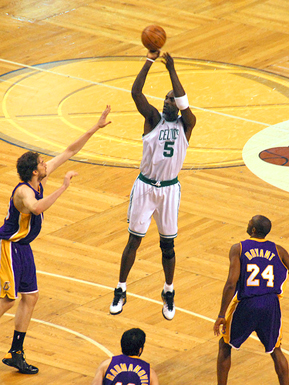Game Six: Can the Celtics Keep It Together?
BU sports doc on the angst and bravado of tonight’s matchup

On Sunday, Kevin Garnett, Paul Pierce, Ray Allen, and company seemed poised to storm the Staples Center in Los Angeles, trounce the Lakers, and take home the Celtics’ first NBA championship in more than two decades. After all, they’d come roaring back from a 24-point deficit in the previous game, a game that was also played on the Lakers’ turf, to take a 3 to 1 series lead. But the championship would have to wait, at least a couple of days more, as the Lakers, led by Kobe Bryant with 25 points, edged the Celtics in game five, forcing the series to this evening’s game six in Boston.
With each game this series is extended, the pressure on the players ratchets up a notch. So, on the eve of tonight’s big game, we decided to check in with Leonard Zaichkowsky, a Boston University professor and director of sports psychology training, which is jointly administered by the School of Education and the School of Medicine.
Zaichkowsky has an international reputation in sports psychology circles, having counseled Olympic athletes, the Spanish national soccer squad, and professional teams, including the National Hockey League’s Calgary Flames, and yes, the Celtics.
BU Today: Which team is under more psychological pressure tonight — the Lakers with a must-win situation or the Celtics, who are in danger of blowing the 3-1 series lead they had before Sunday’s game?
Zaichkowsky: The Lakers have the pressure of needing to win this game to tie the series as well as the pressure of playing on the road in Boston. On the other hand, the Celtics may put extra pressure on themselves, knowing a win tonight is crucial — because anything can happen on Thursday — essentially sudden death. I don’t believe [coach] Doc Rivers has the Celtics thinking anything other than a victory — blowing a lead, I am sure, is not part of his message.
The Celtics fans interviewed in the press after Sunday’s loss still believe that a Celtics win is a lock. Is that kind of fan confidence generally helpful, or is it a recipe for overlooking the power of your opponent?
In order to have success you need a mindset or a belief system that you can beat your opponent. But you need to force them to play on your terms, going with your strengths.
Is there something unique about the psychology of a basketball game that sets it apart from other sports?
Yes — the quick changes of outcomes. Basketball is a fast-paced game and players can go on a scoring run and very quickly reverse the course of a game. Shots seem to go in from every location on the court and a strong confidence/belief system develops. Then, just as quickly, scorers can go into a funk, and nothing seems to fall. The huge confidence of five minutes ago has now switched to self-doubt — an emotional state you don’t want to be in as a player.
After Sunday night’s game, Kobe Bryant admitted that the Lakers had played poorly. The next game is in Boston. If you were the Lakers’ psychologist, what would you tell them?
Indeed, I would tell the Lakers that they have yet to play the kind of basketball they played against San Antonio. Build on what they have done well in the last few games, play tougher defensively, and above all be optimistic — believe you can beat the Celtics.
Is there a psychological component of this series that we should pay particular attention to?
The demeanor of the two coaches. Both Rivers and Phil Jackson stay cool under pressure. There is no shouting and berating of players. They know that they have prepared the players well for the series — and so they let them play. For sure, they make significant adjustments during the game, but they are calculated decisions, not panic moves. Both are always positive towards their players, and as such, they are by and large getting good performances.
Chris Berdik can be reached at cberdik@bu.edu.
Comments & Discussion
Boston University moderates comments to facilitate an informed, substantive, civil conversation. Abusive, profane, self-promotional, misleading, incoherent or off-topic comments will be rejected. Moderators are staffed during regular business hours (EST) and can only accept comments written in English. Statistics or facts must include a citation or a link to the citation.